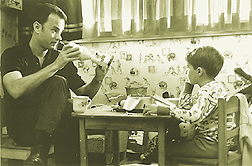
WHENEVER I THINK of Ron Howard I think of freckle-faced Richie Cunningham from Happy Days, and it is only when thinking of Richie Cunningham that Howard's films begin to make sense. How could a director's output be so likable in some instances, and so insipidly corny in others? To answer that question, you need only recall the highs and lows of Happy Days, a show that worked best when it refused to take itself seriously. One Fonzie "Sit on it!" line was worth a dozen scenes of Cunningham and Tom Bosley talking about life.
Coming from that background, it only makes sense that Ron Howard's best films would be his comedies. Splash, Parenthood, and The Paper are very enjoyable pictures, especially the latter--a tough-minded comedy-drama so frenetic and spirited I left the theater saying, "Opie, we hardly knew ye."
 And it follows that Howard's worst films are his most earnest.
Backdraft, an ode to the lives of firefighters, treated
its subject so reverently the picture even ended with text that
said something to the effect of, "There are 30,000 firefighters
in America," as if we were all supposed to stop for a moment
of silence. His Far and Away, starring Tom Cruise and Nicole
Kidman as American settlers, was just painfully bad, reaching
its nadir in a maudlin scene where Cruise and Kidman act out their
dreams in a game of "let's pretend."
And it follows that Howard's worst films are his most earnest.
Backdraft, an ode to the lives of firefighters, treated
its subject so reverently the picture even ended with text that
said something to the effect of, "There are 30,000 firefighters
in America," as if we were all supposed to stop for a moment
of silence. His Far and Away, starring Tom Cruise and Nicole
Kidman as American settlers, was just painfully bad, reaching
its nadir in a maudlin scene where Cruise and Kidman act out their
dreams in a game of "let's pretend."
Now we have Apollo 13, a solemn re-enactment of the near-disaster that befell NASA's 1970 moon mission after one of the spacecraft's oxygen tanks exploded. Guess which one of Howard's two categories this film eventually falls into? (Hint: nobody says "Sit on it.")
The film stars Tom Hanks as commander Jim Lovell, with Bill Paxton and Kevin Bacon as pilots John L. Sigert and Fred W. Haise. We watch as the men prepare for the flight, their wives get edgy, and the journey begins. Much is made of the fact that by this time, America had become bored with the space program, preferring to watch baseball and listen to Jimi Hendrix rather than observe a routine lunar landing. The glory days of the Apollo program were over, giving the proceedings a space-like loneliness that the film touches upon well.
Then the accident occurs and Hanks utters the famous lines, "Houston, we have a problem" (which in astronaut language means "Oh, shit"). The moon landing is called off, the world wakes up and takes notice, and NASA and the astronauts begin working together to overcome a series of imminent practical threats: the loss of oxygen, the lack of power, the lowering temperature. The film is technically superb--the capsule looks and feels as though it really is in deep space, complete with authentic zero-gravity conditions--but the story is more tiring than exciting. The astronauts' only concern becomes getting home and I couldn't help but feel the same way.
The movie pays strict attention to detail, and as an act of describing a historical event has undeniable merit. But as a drama, the movie lacks interest. We already know the outcome in advance, and the conflict is chiefly man-versus-circumstance, so all the main characters ever do is react, suffer and worry.
The actors don't exactly inspire interest, either. Hanks, despite his recent stature, still comes across as a lightweight, and Paxton's hapless character often recalls the moment in Aliens when he says, "Game over man!" Only Bacon lives up to the challenge of giving a solid performance in a literal vacuum.
What a movie like Apollo 13 requires is a star performance by the director. But as hard as Howard tries, he lacks the skills to bring the necessary undertones of terror to the material. Howard fares well during an early, violent dream sequence, but he falls into monotony later on when he tries to turn small accidents into a motif. At various points throughout Apollo 13, we observe, among other mishaps, a car stall, a woman drop her wedding ring down the drain, an overhead projector short out and a woman drop a bowl of salad. That's Ron Howard's idea of being spooky.
Mostly, Howard treats the entire movie as a commemorative event fit for the Fourth of July weekend, complete with such flourishes as zooming inside views of the malfunctioning oxygen tank and rapt panning shots of computer buttons. These sorts of trite effects are piled on, and the music, by plagiaristic composer James Horner, fills every corner of the capsule. This brings up the question: Why go to great lengths to achieve visual realism if you're not going to respect the silence of space to make the aural experience authentic too?
I guess it's understandable that each aspect of Apollo 13 tells us exactly how we're supposed to react. After all, Howard is a child of TV. But a movie like this would benefit from a little ambiguity. The idea that there might be folly to our ambitions to inhabit space, spending millions of tax dollars on operations that can so easily fail, never seems to have crossed Howard's mind. Maybe Richie Cunningham would disagree, but I think if you're going to make a movie that revolves around the moon, there ought to be a dark side.
Apollo 13 is playing at Century Gateway (792-9000) and Foothills (742-6174) cinemas.
Cutline: Ground control: Jim Lovell (Tom Hanks) explains the tools of his trade to his son, Jeffrey (Miko Hughes).








